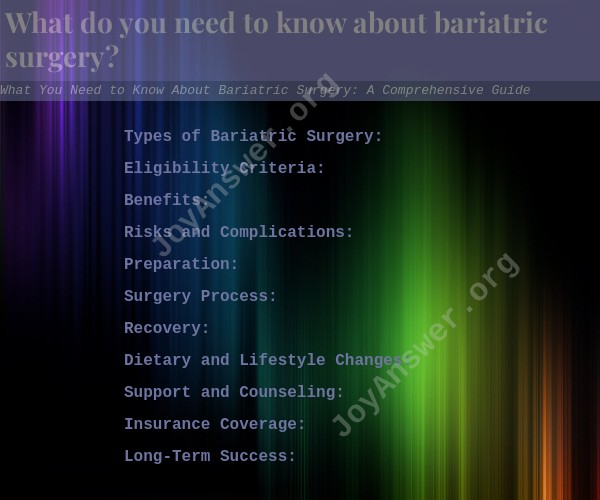What do you need to know about bariatric surgery?
Bariatric surgery, also known as weight loss surgery, is a medical procedure designed to help individuals with severe obesity lose weight and improve their overall health. Here are some key things you need to know about bariatric surgery:
Types of Bariatric Surgery: There are different types of bariatric surgery, including gastric bypass, sleeve gastrectomy, adjustable gastric banding (LAP-BAND), and biliopancreatic diversion with duodenal switch (BPD/DS). Each procedure has its own benefits, risks, and eligibility criteria.
Eligibility Criteria: Not everyone is a candidate for bariatric surgery. Eligibility criteria typically include having a body mass index (BMI) above a certain threshold (usually 40 or 35 with obesity-related health conditions), previous unsuccessful attempts at weight loss, and a commitment to long-term lifestyle changes.
Benefits: Bariatric surgery can lead to significant weight loss, which can help improve or resolve obesity-related health conditions such as type 2 diabetes, high blood pressure, sleep apnea, and joint pain. It can also enhance overall quality of life.
Risks and Complications: Like any surgery, bariatric procedures carry risks, including infection, bleeding, blood clots, and adverse reactions to anesthesia. There can also be long-term complications, such as vitamin and mineral deficiencies, gallstones, and gastrointestinal issues.
Preparation: Before surgery, patients typically undergo a thorough evaluation, including medical and psychological assessments. Pre-operative preparations may include dietary changes, exercise, and counseling.
Surgery Process: The specific surgical procedure will vary depending on the type of bariatric surgery chosen. Generally, it involves making changes to the stomach and/or digestive tract to limit food intake and absorption.
Recovery: Recovery times vary, but most patients can return to normal activities within a few weeks. Post-operative care includes a gradual transition to a new diet, regular follow-up appointments, and ongoing monitoring of nutritional status.
Dietary and Lifestyle Changes: Bariatric surgery is not a quick fix; it requires a lifelong commitment to dietary and lifestyle changes. Patients must adhere to a specific diet, take nutritional supplements, and engage in regular exercise to achieve and maintain weight loss.
Support and Counseling: Many bariatric surgery programs provide access to support groups and counseling to help patients address the emotional and psychological aspects of weight loss.
Insurance Coverage: Some health insurance plans cover bariatric surgery, but coverage varies widely. Patients should check with their insurance provider to understand the extent of coverage and any requirements.
Long-Term Success: The success of bariatric surgery depends on patient compliance with post-operative recommendations. It is important to work closely with a healthcare team to achieve and maintain weight loss goals.
Risk of Weight Regain: While bariatric surgery can lead to substantial weight loss, some patients may experience weight regain over time. This underscores the importance of long-term lifestyle changes and follow-up care.
Before considering bariatric surgery, individuals should consult with a healthcare provider, such as a bariatric surgeon, to discuss their options, assess eligibility, and make an informed decision. Bariatric surgery can be life-changing for many people with severe obesity, but it is a significant medical intervention that requires careful consideration and commitment.













